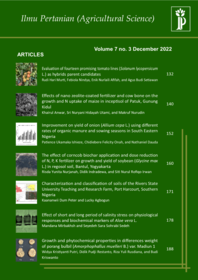- Focus and Scope
- Section Policies
- Peer Review Process
- Publication Frequency
- Open Access Policy
- Publication Ethics
- Screening Plagiarism
Focus and Scope
Ilmu Pertanian (Agricultural Science) is scientific, open access, peer-reviewed journal and provides forum publications of novel research in all aspect of tropical agricultural science with the scope of smart agriculture, agronomy, plant science, soil science, genetics and plant breeding, biotechnology in plant breeding, plant technology, and plant productions. Ilmu Pertanian (Agricultural Science) is published three times annually, April, August, and December.
Section Policies
Review Articles
Research Articles
Peer Review Process
Screening process: Manuscript submitted to Ilmu Pertanian (Agricultural Science) will be screened by Editor-in-Chief to ensure that the manuscript fits into Journal’s scope and follow the author's guidelines. If the manuscript passes from the screening stage, it will be assigned to give Editor to handle and give reviewers. If the manuscript failed from the screening process, it will be rejected without further steps or returning to the author to revise the manuscript based on the Journal’s standard.
Peer-review: The manuscript will be double blind review by two reviewers. Some corrections/suggestions from reviewers for each manuscript will be sent to the author.
Revision Stage: Author will revise the manuscript and resubmit in the submission system. A manuscript is considered withdrawn, if the author does not respond within 3 months after the review results are given.
Final Decision: The author as the contact person will be notified of the final decision of the editors. Final decision for accepted the manuscript depend on the result of the revision and reviewer recommendations.
Proofing: An accepted manuscript will be processed to final round for proofreading by a language professional editor, editing process and lay-outing. Final format manuscript will be returned to the author for final checking and approval. Manuscript will be published if the authors give an approval of the final manuscript.
Publication Frequency
Ilmu Pertanian (Agricultural Science) published three times a year in April, August, and December.
Open Access Policy
This journal provides immediate open access to its content on the principle that making research freely available to the public supports a greater global exchange of knowledge.
Publication Ethics
The publication of articles is essential in the development of a comprehensive network of knowledge for a peer-reviewed journal. Therefore, it is important that each publishers, editors, authors, and reviewers should take the journal publishing process by themselves based on the highest level of professional ethics and standards based on Committee Publication Ethics (COPE's Best)
The publisher’s dedication is to support the editor’s considerable efforts, author’s academic contribution and reviewer’s appreciated voluntary works. It is also the responsibility of a publisher to make sure that the publication system runs smoothly, and to support the editor, authors and reviewers in performing their ethical duties with the application of ethical guidelines.
The followings are lists of the editor’s responsibilities:
- The editor should admit acknowledge receipt of submitted manuscripts within two working days of receipt and makes sure the review process is efficient, fair, and on time.
- The editor should ensure that confidential manner is treated to the submitted manuscripts with no disclosure of the content whatsoever other than the corresponding author, reviewers, and the publisher, as necessary.
- The editor should withdraw himself or herself from processing manuscripts when any conflict of interest exists between him or her and the authors or institutions in relation to the manuscripts
- The editor should make sure no disclosure of the names and details of the reviewers to a third party without the permission of the reviewers.
- The editor’s right includes the final decision on whether to accept or reject a manuscript in refer to the significance, originality, and clarity of the manuscript and its relevance to the journal.
- The editor should not oblige the authors to cite his or her journal as a condition for the manuscript to be accepted for publication.
- The editor is not allowed to use any part or any data or work reported in the submitted manuscript for his or her own research.
- The editor should give prompt response and take reasonable measures upon ethical complaint concerning a submitted manuscript or a published paper, and he or she should contact and consult with the author immediately, in which a written formal retraction or correction may also be required.
The followings are lists of the author’s responsibilities:
- The author should not submit coexisting manuscripts (or manuscripts with similar subject matter) to multiple journals. Also, he or she should not submit any paper that has already been published anywhere. However, when certain conditions are met, publication of articles on specific subject matter, such as clinical guidelines and translations, in more than one journal is acceptable.
- The author should present an accurate and brief report of his or her research with inseparable description of its significance.
- The author should gather and interpret his or her research data in an honest manner. Publishers, editors, reviewers, and readers are allowed to ask the author to provide the raw data for his or her research for the editorial review and public access conveniences. If necessary, the author should prepare such data for any possible use prior to publication.
- The author should guarantee the originality of her or his submitted work. The use or work and/or words by others should be provided with appropriate citations. Any forms of plagiarism is an unethical publishing behavior and highly intolerable.
- The author should provide explicit indication of any sources supporting the research as well as declaration of any conflict(s) of interest.
- The author should give acknowledgement to all of those who have made contributions to the research. Those with significant contributions to the research should be listed as coauthors who have affirmed the final version of the paper and agreed on its final publication.
- The author should give prompt information to the editor when there is any evident error(s) in his or her published paper, as well as earnest cooperation with the editor in the retraction or correction of the paper. When any party other than the author notifies the editor that the published paper contains an obvious error, a retraction or correction should be made by the author based on the medium of publication.
The followings are the lists of reviewer’s responsibilities:
- The reviewer should immediately notify the editor and excuse himself or herself from the reviewing process of the manuscript or when he or she feels unqualified to review the assigned manuscript, or affirms that he or she cannot meet the deadline for completion of the review.
- The reviewer should inform the editor and withdraw himself or herself from reviewing the manuscript if there is a conflict of interest. Specifically, he or she should withdraw himself or herself from reviewing any manuscript authored or coauthored by a person with an obvious personal or academic relationship with him or her, if the relationship may cause bias or the reasonable perception of bias.
- The reviewer should ensure that confidential manner is treated to the manuscript. It should not be disclosed to or discussed with others except as authorized by the editor.
- The reviewer should take objective approach upon the peer-review job. There should be no personal criticism to the author.
- The reviewer is not allowed to use any part or any data or work reported in the submitted manuscript for his or her own research.
- The reviewer should immediately inform the editor when recognizing any similarity between reviewed manuscript and another paper published or under consideration by another journal. The reviewer should give immediate call to the editor’s attention when the manuscript contains plagiarism or fabricated data.
Screening Plagiarism
Ilmu Pertanian (Agricultural Science) check plagiarism for the article using Turnitin













